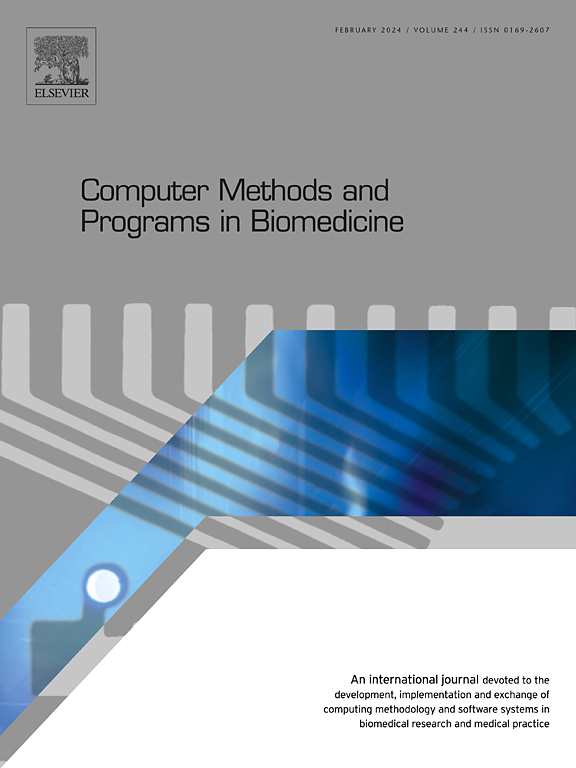基于改进优化方法的混合神经网络和机器学习模型研究子宫内膜异位症患者肠道微生物组对睡眠质量的影响
IF 4.9
2区 医学
Q1 COMPUTER SCIENCE, INTERDISCIPLINARY APPLICATIONS
引用次数: 0
摘要
背景与目的子宫内膜异位症是一种慢性妇科疾病,影响全球数百万妇女的生活质量,通常表现为影响睡眠质量的症状。新出现的证据表明,肠道微生物群在调节包括睡眠在内的各种生理过程中起着至关重要的作用。本研究使用机器学习(ML)技术,即人工神经网络(ANN)和支持向量回归(SVR),研究子宫内膜异位症患者肠道微生物组组成与睡眠质量之间的关系,并采用几种混合方法,如基于ML的ANN和SVR,以及使用部分群优化(PSO)和改进的PSO进行优化。我们分析了200名子宫内膜异位症患者的数据,包括不同年龄、体重指数(BMI)、症状严重程度和生活方式因素。主要肠道菌群包括拟杆菌、普氏菌、瘤胃球菌、乳杆菌、粪杆菌和Akkermansia。此外,生活方式变量,如饮食质量、体育活动水平、每日卡路里摄入量、纤维摄入量、糖摄入量、酒精摄入量、吸烟状况等,也被用于预测睡眠质量。方法采用支持向量机(SVM)、神经网络(NN)等先进的机器学习模型对数据进行分析。提出了两种混合机器学习方法,即SVM-改进粒子群优化(IPSO)和NN-IPSO作为混合SVR和NN结合IPSO预测睡眠质量的方法。在改进的粒子群算法中,为了更好地校正混合模型中神经网络和支持向量机的参数,提出了粒子的局部搜索位置。在改进粒子群算法的局部搜索中,采用最优粒子,对新粒子采用随机调整过程。结果与结论几种ML方法均显示子宫内膜异位症患者特定肠道菌群与睡眠质量有显著相关性。混合方法比传统的基于神经网络和支持向量回归的机器学习方法更准确,这些方法通过使用局部搜索表现出很强的预测倾向。探索肠道微生物组影响睡眠的潜在机制可以为潜在的治疗靶点提供更深入的见解。本文章由计算机程序翻译,如有差异,请以英文原文为准。
Hybrid Neural network and machine learning models with improved optimization method for gut microbiome effects on the sleep quality in patients with endometriosis
Background and Objective
Endometriosis is a chronic gynecological condition known to affect the quality of life of millions of women globally, often manifesting with symptoms that impact sleep quality. Emerging evidence suggests a crucial role of the gut microbiome in regulating various physiological processes, including sleep. This study investigates the relationship between gut microbiome composition and sleep quality in patients with endometriosis using machine learning (ML) techniques named artificial neural network (ANN) and support vector regression (SVR) with several hybrid approaches as ML-based ANN and SVR coupled with optimization using partial swarm optimization (PSO) and an improved PSO. We analyzed data from 200 endometriosis patients, encompassing a diverse range of age, Body mass index (BMI), symptom severity, and lifestyle factors. Key gut microbiota, including Bacteroides, Prevotella, Ruminococcus, Lactobacillus, Faecalibacterium, and Akkermansia, were quantified. Additionally, lifestyle variables such as diet quality, physical activity level, daily caloric intake, fiber intake, sugar intake, alcohol consumption, smothking status are applied for predictions of sleep quality.
Methods
Advanced machine learning models, including Support Vector Machines (SVM), Neural Networks (NN) were employed to analyze the data. Two hybrid machine learning method named SVM- improved particle swarm optimization (IPSO) and NN-IPSO as hybrid SVR and NN combined with an IPSO is proposed for prediction of sleep quality. In the enhanced PSO, a local search position of particle is developed for better calibration of the parameters in NN and SVM applied in hybrid models. In local search of improved PSO, the best particle is applied with a random adjusting process applied for new particles.
Results and Conclusion
These several ML methods showed that revealed significant associations between specific gut microbiota and sleep quality in endometriosis patients. The hybrid methods are more accurate than traditional machine learning methods-based NN and SVR that these methods exhibit a strong predictive tendency by using the local search. Exploring the underlying mechanisms through which the gut microbiome influences sleep could provide deeper insights into potential therapeutic targets.
求助全文
通过发布文献求助,成功后即可免费获取论文全文。
去求助
来源期刊

Computer methods and programs in biomedicine
工程技术-工程:生物医学
CiteScore
12.30
自引率
6.60%
发文量
601
审稿时长
135 days
期刊介绍:
To encourage the development of formal computing methods, and their application in biomedical research and medical practice, by illustration of fundamental principles in biomedical informatics research; to stimulate basic research into application software design; to report the state of research of biomedical information processing projects; to report new computer methodologies applied in biomedical areas; the eventual distribution of demonstrable software to avoid duplication of effort; to provide a forum for discussion and improvement of existing software; to optimize contact between national organizations and regional user groups by promoting an international exchange of information on formal methods, standards and software in biomedicine.
Computer Methods and Programs in Biomedicine covers computing methodology and software systems derived from computing science for implementation in all aspects of biomedical research and medical practice. It is designed to serve: biochemists; biologists; geneticists; immunologists; neuroscientists; pharmacologists; toxicologists; clinicians; epidemiologists; psychiatrists; psychologists; cardiologists; chemists; (radio)physicists; computer scientists; programmers and systems analysts; biomedical, clinical, electrical and other engineers; teachers of medical informatics and users of educational software.
 求助内容:
求助内容: 应助结果提醒方式:
应助结果提醒方式:


